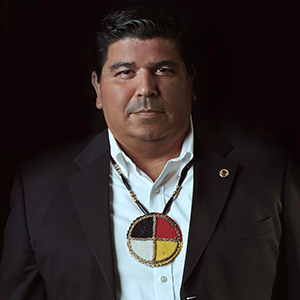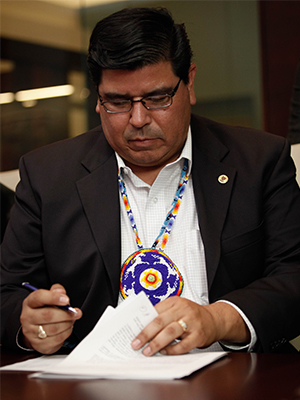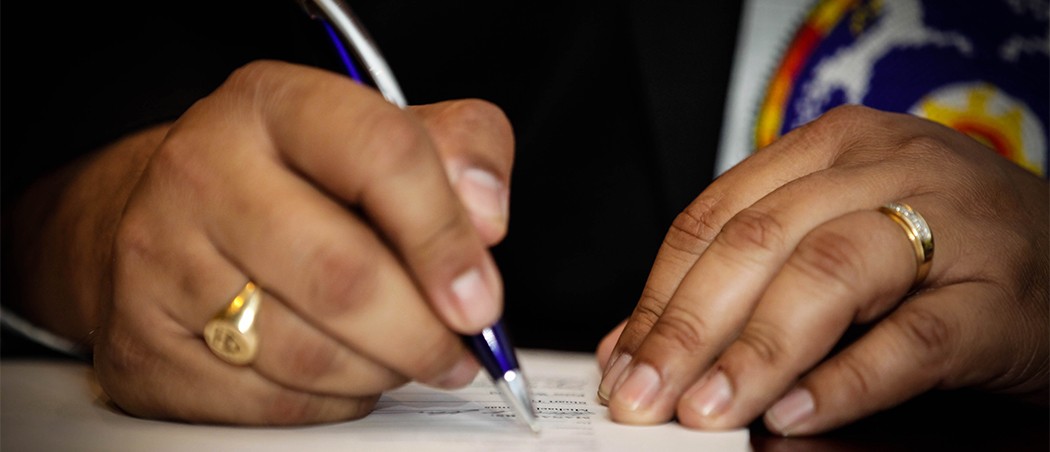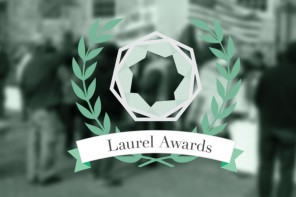One of the hottest topics surrounding the hemp and cannabis industry, as of late, has not been if Native American Tribes would get involved, but when? The answer to that questions seems to have become more clear this week as CannaNative, LLC., a native-owned company whose goal is to help tribes develop hemp and cannabis based economies on Native American lands throughout the United States, announced a historic partnership with General Hemp, LLC. This partnership represents a large step forward for native involvement, as now all of the 566 federally recognized tribes in the United States will have access to more support, education and industry resources than ever before. In order to find out just how CannaNative, LLC. plans on impacting native tribes across the country, we sat down with CannaNative Co-Founder and Owner Anthony Rivera.
Native American tribes have a long history with hemp cultivation and application until that changed in the early 20th century. Where is native involvement now in your eyes?
It’s more of a reemergence right now for us. It’s been a long time since this crop has been cultivated here in the United States, and there’s definitely a natural, native cannabis which sometimes is referred to as ‘Indian weeds’, which grows wild out there. Cannabis is a historic crop, not only in the United States, but it has been used around the world as medicine and as fibers for centuries, so it’s more of a reemergence for Indian country when it comes to cannabis. We’re turning back, reaching to the past as far as the traditions and the cultures of medicine are concerned, and then combining it with a modern economy and marketplace. We’re very excited about it and we’ll see what happens.
Prefer to listen to this interview? Listen below!
The current state of native involvement does look to be shifting, especially with the historic partnership CannaNative, LLC., just signed. Can you tell us about it and why it’s making such big news?
Yes. This is big news. As a matter of fact, launching today in press releases around the country. That is the partnership between 7 Green Feathers and General Hemp, LLC. 7 Green Feathers is a company which is native owned by myself and a great team of native folks who have experience in Indian country, whether it’s tribal leadership, tribal finance, economic or business development. Our new partner, General Hemp, LLC. is one of the leaders in the cannabis industry. They bring a great track record and industry knowledge to the table, not only here in the United States, but globally. We felt that our visions were compatible.
We felt that the professional leaders at General Hemp, LLC. would bring their experience and expertise into Indian country to support our leadership. Their expertise will fit very nicely in the marketplace. For those reasons, we formed a partnership. We’re very excited about it, and we’re bringing it into Indian country.
You’re a former Tribal Chairman and now you’re the co-founder of CannaNative. Can you walk us through what led you to want to start and co-found an organization like CannaNative?
Excellent question. This was the last industry I ever thought I was going to enter. Prior to founding CannaNative, I was working alongside my future Co-Founders Cedric Black Eagle, former chairman from the Crow Tribe, and Andy Nakai from Navajo Nation, in Indian country. We were primarily focused on financial and business development projects, as well as bridging the gap between corporate America and Indian tribes in an effort to find certain ways to help tribes leverage their advantages in the corporate business development world. That being said, it wasn’t until late 2014 when Department Of Justice memo, called the ‘Wilkinson’s memo‘ came out that basically provided guidelines for tribes if they were considering entering into the cannabis industry. That sparked a lot of interest and a lot of curiosities.

Left to Right: Andy Nakai (Navajo Nation), Anthony Rivera, General Hemp, LLC. President Dr. Stuart Titus and Cedric Black Eagle prepare to sign historic partnership.
We were naturally curious to see “What does this have to offer Indian country as far as a real economic opportunity?” We continued doing some research. We interviewed a lot of folks. We asked a lot of questions, and we used our economic development experience to weigh the advantages. We saw a potentially big opportunity based off of our prior industry building experience that Indian country has a strong background in. We felt that this would be a new, emerging, up and coming industry that perhaps we can apply.
For example, we could take our Indian gaming industry experience, and apply it here, to build a new industry. What we saw while conducting our due diligence was an emerging industry that we believe tribes can really take advantage of. Tribes can apply other industry experiences, like Indian gaming, and take this to another level, not only a higher business level, but another level where tribes can be truly self-sustainable and truly exercise their full access of tribal sovereignty. We formed CannaNative, LLC., to make sure that we can do that. We formed a great partnership with General Hemp, LLC., because of their fantastic experience and it’s been nothing but positive and successful as we’ve moved forward.
You mentioned in the beginning of that answer something that I liked, because one of the things we like to do is talk about people who come from fantastic backgrounds outside the cannabis space, and then enter the industry and become very impactful. You’re a great example of this as a Harvard graduate.
That’s true. I went to graduate school at Harvard University and got a lot of really great training there. They taught me how to really reach out, expand, set goals to accomplish, and to reach high on my expectations. That was a great experience. It wasn’t always an easy thing to do.

CannaNative Co-Founder Anthony Rivera, Jr. hopes to usher in new era of tribal participation in the hemp and cannabis industries.
I mean, I was just a simple Indian kid from Southern California, and somehow got some great ideas on what I could do. A lot of challenges before me, but I didn’t let any challenge get my way. I made sure that I just went for it, and before I knew it, I was on full scholarship as a grad student at Harvard University. I got some great training, took that training, and applied it to everything I’ve done since and it has served me well.
After graduating from Harvard, I returned back to Southern California and did some post-graduate work. I reported back to my tribe and provided service back to them so that I could see how I might apply what I had learned to Indian country. I became a council member for my tribe. Eventually was elected Tribal Chairman and served for about ten years. It was a wonderful experience to do all those things.
You must have been one of the youngest representatives around, right?
Yes. By the time I was elected Tribal Chairman in 2005, I was definitely one of the younger Tribal Chairmen. I met with members of the Southern California Tribal Chairmen’s Association, which is a group of about 20 Tribal Chairmen. I worked very closely with them and there were some great leaders and mentors in that area, but I was definitely one of the younger ones there. I was able to learn a great deal from these great leaders and applied that to not only my leadership, but also to my business applications.
Now, how typical was it to see someone, at that young of an age, put into such a position of power?
Usually, you don’t see that very often. Typically, you have to work your way up in the ranks. Some people like to see more seasoned tribal leaders. There are some tribal leaders out there that have been serving consecutively for 20 years and are armed with incredible experience. For me, my experience at Harvard combined with the tasks my tribe needed to be accomplished in Washington D.C. and economically made me the prime candidate and they believed I could get the job done.
I was willing to put together a great team to accomplish a lot of these things, and we accomplished quite a bit under that leadership. We had the energy. We had the drive and didn’t let anything get in the way. Sometimes, folks that are a little bit younger don’t seem to have the same fears or challenges. They just go for it. I was kind of that mentality, but I did grow a lot, matured a lot, and did a lot of important things that helped me to establish that base for experience.
Anthony Rivera Discusses Native Involvement and Historic Partnership
How has that experience as a Tribal Chairman helped you in this endeavor? What have you learned that’s helped you propel yourself forward?
After being a Tribal Chairman for almost a decade, there aren’t many things that either surprised me or scare me. I’m willing to face any challenge face on, and I know with the right team, we can accomplish it. I’m not afraid of anything. In this industry, because there are so many challenges ahead of us, it reminds me of a lot of the challenges that we had in government.
I’m able to take that experience and apply it in the industry to build it up. We have a great team working here, and we’re accomplishing a lot in a short amount of time. We have a great future ahead and I think it’s going to be great for Indian country as a whole.
Back to the partnership with General Hemp, LLC., that we talked about a little bit earlier. What was the appeal behind this big partnership?
What I liked about General Hemp was that their leadership team had a very similar vision as we did. They saw into the future. They really grasped the idea of providing economic solutions, as well as health and medical type solutions for Indian country in that marketplace. They grasped that vision pretty quickly.

CannaNative, LLC. Co-Founder and Owner Anthony Rivera signing the historic partnership agreement with General Hemp, LLC.
Additionally, I really liked their track record. They are the leaders in the industry as far as product development, cultivation, manufacturing and distribution, and retail. They have products on the market, not only globally, but here in the United States, that have already been established. With our partnership together, we can take all those things and immediately get on the ground without having to try to recreate the wheel.
Indian country is coming to the industry maybe a little bit late. Not too late because it’s new, but much like the gaming industry. Gaming was already set up and established, rolling pretty well for at least a couple of decades, and tribes were able to come to that with good teams, good management, and good experience to take it to the next level. We’re looking on doing the same thing here.
Most of all, I think the one thing I liked was the compatibility. We were both very compatible together. That has allowed us to grow closer together and stronger so that we can be a trusting organization that works very closely together.
Now, the formulation of CannaNative, LLC. and the partnership with General Hemp, LLC. was covered in a Bloomberg news report that came out this week. What does that mean to you to see the mainstream “Media” talking about this and covering this?
You know what? That really was an exciting thing. ‘Bloomberg’ contacted us and said that they were looking for some information on how tribes are dealing with this business. The interesting connection we had came back in May of this year, ‘Bloomberg’ published an article asking a very interesting question. “Who wants three billion dollars in cash? Traditional banks do not.” Something like that.
I mean, I missed that question or I would have thrown my name into the hat.
Exactly. Seriously though, we started really thinking about it and pondering the opportunity for tribal involvement.
We came to the conclusion that, “Hey. With the cash management and banking experience that tribes have in regard to Indian gaming casinos, perhaps we can apply that to this industry.” We started exploring that, looking into that, and the answer to the question is Indian tribes want a shot at that money. A major part of our business development is developing a financial and banking solution for the industry to banking on tribal lands, which are sovereign. It was a major endeavor for us to be featured in an article on the level of ‘Bloomberg’.
The media coverage has been very exciting and we think that tribes deserve such a level of coverage from everything they’ve accomplished. We’re looking to get as much exposure as possible so that we can show that Indian tribes have a great track record and a good, established foot to leap off of here.
If the upside to native involvement and the money associated is as potentially large as some project it to be, what has been the biggest obstacle that’s prevented them from getting into the space already?
I think the biggest roadblock is the same one Indian tribes always face, and that seems to be the federal government. The federal government typically moves way too slow or just refuses to move altogether. Even worse, sometimes the feds seem to forget their treaties entirely or just doesn’t understand what is happening. I think right now, for us, getting the federal government up to speed is the biggest barrier. We’re breaking down this barrier by being extremely proactive and collaborative with the Department of Justice and any other federal agency we need to.
I think the biggest roadblock is the same one Indian tribes always face, and that seems to be the federal government.
They understand exactly what our intentions are, and at the same time, we’re forming our own standards, regulations and legalization on the reservation, which tribes have the sovereign ability to do. Through our collaborative and proactive approach, which is not only responsible but also strictly regulated, we can demonstrate that we intend to handle this industry just like we’ve done already with Indian gaming.
In your experience, how does native culture view hemp overall? Is it the same as cannabis? Is it different or is the education not there yet?
I think traditionally, we’ve always had a very close affinity with natural culture, natural healing, and medicine. Indian tradition, as far as natural medicines and healings is concerned, lies in the fact that we’ve always seen nature as our natural pharmacy. The healers, the medicine men and women were the native doctors of the past. This is a rich culture that every tribe has and preserves. Now, in between time, I would say the last few decades, this particular plant, the cannabis plant, has received all kinds of different stigmas, so there is at this time a re-education and reminding of how we used natural medicines. We don’t want to lose the natural healing and medicine part of our culture, and we want to turn back to nature and turn back to our traditions and cultures to make sure we preserve that.
Cannabis is one of those plants. We’re not looking just at cannabis, which does have medicinal value and it does have other types of productive value that we see and that we want to reintroduce back into here in the United Stats on Indian reservations, but we’re also looking at other plant uses as well and remedies that come from other plant life. We’re looking at all kinds of things to reintroduce that healing, medicinal, and natural tradition back into Indian country and the United States.
Native American tribes really have a chance to grab a stranglehold of the cannabis or hemp industry however they so choose. People outside who maybe aren’t as educated see that, and they think, “These tribes are already making a bunch of money.” But that isn’t true, is it. Sure, some tribes are making a great amount of money, but that isn’t representative of the entire 566 recognized tribes in the US.
No, it’s not. Indian gaming was a great stepping-stone for Indian country to get out of that rut, whether it was poverty or dependency. Indian gaming allowed tribes to generate revenues on their own properties to enhance these types of economic development, sustainability, or other kinds of programs on their reservations. Now, of course, even though Indian gaming was legalized for all tribes, not all tribes benefited. Only a small percentage did, and some of those you might know who are very lucrative and very successful.
Every tribe can participate. Every tribe should participate.
We believe that this industry, the cannabis industry will level the playing field for all tribes because your location really doesn’t matter. All tribes can participate in this industry at any level just by having sovereignty, a land base, a good partner, and a good team to show them how to do it right and legally. Every tribe can participate. Every tribe should participate. Every tribe should at least make a decision whether they’re going to participate or not, but every tribe has an opportunity to engage and profit through this industry, unlike with the gaming industry which was more location-based.
We’re very excited to bring to all 566 tribes out there the opportunity to do it right and to become self-sufficient. In other words, their economies on this industry alone could sustain their membership and sustain their governments and their future, without dependencies on the scraps that the federal government provides to tribes, which seem to get smaller and smaller every year.
After being a Tribal Chairman for almost a decade, there aren’t many things that either surprised me or scare me.
It’s going to take some time, effort, and planning, but you know what? We’re already on the move. We’re already engaged, and the tribes that are a visionary and are ready to take those steps, we’re ready to help them do that.
We’ve talked business this whole interview, how about a personal question. What does Anthony Rivera Jr. do in his free time?
When I do have free time, which I try to make, I like to be out on the golf course, especially at the Indian Resort golf courses. I love the beauty of those courses.
Do you get a discount when you go to the course? What’s the scoop?
It depends on who I go with. That’s for sure. There are some lovely resorts and golf courses all over Southern California. I certainly encourage everyone to visit these beautiful locations and great courses out there on Indian reservations.
Can I get you to pick your favorite Indian reservation course or do you not want to commit to that in writing?
I’m going to say they’re all my favorite because they’re all very unique, different and exciting. I love getting out on the course and getting some fresh air. Believe it or not, there are some really good Indian golfers out there.
Of course, I also enjoy spending time with my family as much as possible in my free time. I love college football and a good book as well. You’ll always see me with a book in my hand or on my bookshelf. I also love to travel and have been to some great places across the globe.

How about the favorite country you’ve been to outside of the U.S.?
You know what? One of my favorite places in the world, and I’ve been to many places all over the world, has got to be in Guatemala.
There’s a little hacienda there at Lake Atitlan. It’s just one of my favorite places that I just love going to. It’s my little paradise and I have to say, out of everywhere I’ve been, that is my favorite place.
Circling back to college football. Is it the whole sport or do you have a specific team you root for?
I just love the whole sport in general. I love the excitement of college football, everything from the Ivy League to the West Coast Leagues and the Big Ten, the Pac-12, the Mountain West and all the others. I just love college football. It’s very exciting and I love going to games when I can.
Let’s glance into our crystal ball, prognosticate a little bit and predict on what’s on the horizon. Where do you see native involvement with the hemp and cannabis industries, in a year or two from now?
I think because of how rapid things are moving right now, in a year or two we’re going to be quite far ahead of where we are now. Just in the last six months, we’ve been able to accomplish a lot of the regulatory and legal issues that were before us. We’ve been able to set up good collaborations with the federal government.
We believe collaboration is really the key to this industry. Gaming was so competitive. We’re looking forward to making alliances and working together with a lot of different folks.
We’re not without our challenges. There have been some issues that have come up along the way, but those mostly involved mistakes in the approach, which we quickly corrected. With the way that we provide advice and manage, we believe that within the next one to two years we’ll be one of the leaders with our tribal partners in the industry, not only in cultivation and processing, but also exporting materials, finance and banking to retail and product lines. I think we’re going to see a lot of revolutionary things from Indian country alone, simply based on the spirit of entrepreneurship and economic development that tribes have right in front of them. We’re excited to see what’s going to happen.
Keep an eye out for what’s happening with us. You can always follow us on Twitter at @CannaNative. We try to keep folks posted on the industry and what we’re doing there as well.
For CannaNative, now that you’ve announced the partnership and you have the media swarming around you, asking for interviews, what’s next on the horizon for you and the team?
Next we’ll be engaging and closing some deals with specific tribes in strategic locations. You’ll be seeing those as we roll those out and release announcements. Also, we’ll be forming different types of collaborations.
We believe collaboration is really the key to this industry. Gaming was so competitive. We’re looking forward to making alliances and working together with a lot of different folks. Of course, we’re looking forward to announcing different CannaNative labeled product lines and developing a natural native remedy product line.
We have a lot of super exciting things and it’s really going to be neat. Those are coming out here shortly. We’ll make sure we connect with you, Tim to announce those things to your audience because we’d love for them to see these new projects, learn about them, and pass them along.
What do you think this historic partnership means for the cannabis and hemp industries moving forward? Join the conversation and comment below!










